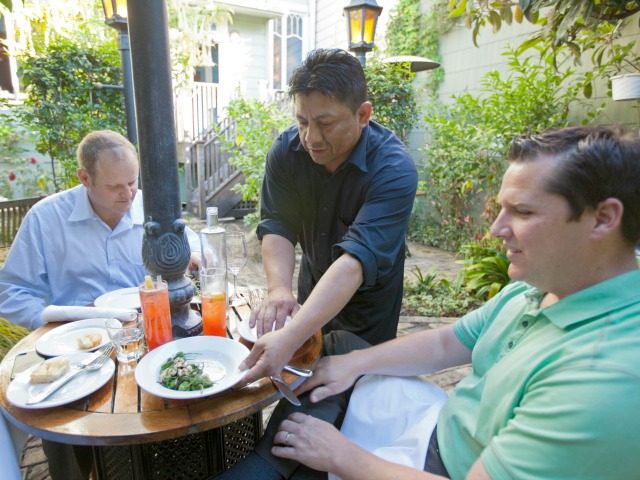President Donald Trump’s low immigration/high wage policy is boosting the low wages and social status of kitchen workers in California, according to a magazine covering the upmarket town of Monterey Bay where the median house price is more than $630,000.
The article, mournfully titled, “Empty Kitchens: In restaurants these days, good help is hard to find,” interviews several restauranteurs and produces much cheerful news for the many ordinary Americans who are hoping to earn higher wages, learn new skills and get promoted in the food industry:
Passionfish chef-owner Ted Walter said immigration concerns remain the biggest factor in the shrinking talent pool …
…
Qualified cooks and dishwashers have all but disappeared, and in response local restaurants have lowered their standards while raising pay. Current applicants have weaker skills, Fisher said, and cooks with just a few years experience are applying for jobs better suited to those with a decade or more on the line.
…
“We pay dishwashers $14 an hour ($3 above minimum wage) to offset (the shortage),” Fisher said. “To be honest, it’s the most integral position. If you can’t put food on a clean plate you have nothing to sell. And if the dishes pile up the whole process breaks down.”
In the good old days before Trump, “restaurant owners could always keep kitchen salaries in check because [job] candidates were lining up around the block,” the article admitted.
However, wages nationwide are creeping up very slowly amid determined opposition from business owners.
In that wage fight, the business owners are hugely aided by federal immigration policy which delivers the huge annual inflow of 1 million legal immigrants, plus a population of at least 1.5 million visa-workers — including white-collar H-1Bs and blue-collar H-2Bs — plus the supply of roughly 8 million working illegal migrants. The food industry employs roughly 1 million illegals alongside millions of Americans, both native-born and illegal.
Food-industry lobbyists are now pushing the federal government to amnesty roughly 2 million younger illegals, including roughly 700,000 ‘DACA’ recipients. That food industry is the biggest employer of these young illegals.
Roughly 4 million young Americans enter the workforce each year.
Despite the potential political payoff in November, Trump has done little to tout his improvements or to bully employers into raising wages. On April 12, for example, Trump used a White House press conference to tout the tax cuts, but spent little time spotlighting the modest-but-real wage increases:
And something a lot of people didn’t think was going to happen — wages are rising at the fastest pace in over a decade … Projections for capital investment and wage growth have also set new all-time records, and we’re just getting started.
In Monterey, the labor pressure is also forcing managers to accommodate their employees’ priorities, such as closing the wage gap between the mostly Latino kitchen crews and the mostly white dining-area staff:
But Guzmán recognizes the need to develop relationships with his crew, and his management style has evolved. It has to. In the end, he’s trying to save an industry that once saved him … He wants them to know they are needed, and valued.”
The state’s vast population of economic migrants in the state has allowed employers and consumers to shrink kitchen-staff wages to poverty levels:
According to the Living Wage Calculator, a metric created in 2004 by MIT, a living wage for two adults (one working) with one child in Monterey County is $25.59 an hour, or roughly $53,000 per year. Currently the median salary for a restaurant cook is $24,323.
Those low wages can force legal or illegal-immigrant kitchen staff in Monterey Bay to take three jobs:
Seventh & Dolores cook Jesse García, 31, lives with his mother and little brother in Monterey. He works the line at the lively Carmel steakhouse Sunday through Thursday, following his daytime shifts at Tilly Gort’s in Pacific Grove. On his “days off” he works as a roofer. “Most guys have other jobs,” said García.
The new shift in power from employers to employees in Monterey Bay mirrors conditions nationwide, helping to explain why the restaurant industry strongly opposes Trump’s pro-American policies.
That disagreement has sparked dramatic fights over the shrinking supply of cheap workers for the food industries in New York, Washington D.C., Oakland, Calif., and elsewhere.
Read even more of the good news here.

COMMENTS
Please let us know if you're having issues with commenting.